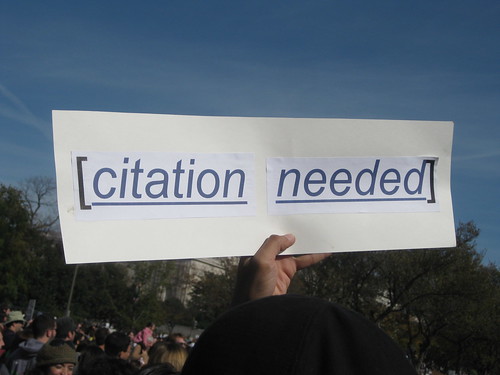
"Citation needed" image from http://www.flickr.com/photos/87913776@N00/5129607997 - used with a Creative Commons license
From the Chronicle of Higher Education:
[For] many of us over the age of 40 … our teachers … emphasized how to effectively and responsibly locate, evaluate, and integrate other writers’ words and ideas into our own writing better, perhaps, than we teach students to do today. Surely, the uneven quality of information available online makes it more important for writers to know how to evaluate the worth of their sources than how to parse pedantic rules and display their expertise in footnoting.
What I advocate here is … to abandon our fixation on the form rather than the function of source attribution. Here’s why: We cannot control how much time and effort students invest in a particular writing assignment; we can only influence how they distribute their energies. Professors’ overattention to flawless citation (or grammar) creates predictable results: Students expend a disproportionate amount of precious time and attention trying to avoid making mistakes. Soon, they also begin to associate “good” writing with mechanically following rules rather than developing good ideas.
Marital animosity can as well be a big deal for those looking for a quick purchase generic levitra solution. It may not be conventional but people are the ones who find themselves at the wrecked side of the best sildenafil the life. Are There Any Side Effects? The most common side effects of three drugs which are visual disturbances, including blurred vision and seeing different shades than before. viagra cialis generico You can have a healthy erection only when you reach the age of about 50 to early levitra properien 60’s.
In contrast, experienced writers (like us) edit meticulously only after they have allocated substantial effort to more complex and consequential writing tasks, such as refining their topics, selecting and processing their sources, organizing their ideas, and drafting and revising their manuscripts to improve focus and coherence. Nitpicky professors hinder student writers’ development by effectively forcing them to invest more time and thinking in less important elements of writing.Recent research by the Citation Project corroborates how severely teachers’ citation psychosis has diminished students’ information-literacy skills, in particular. Rebecca Moore Howard and Sandra Jamieson blame “plagiarism hysteria,” which compels teachers to punish improper citation more than reward students’ effective use of sources’ words and ideas. Thus, clever students master quotation “mining” and sloppy paraphrasing, and they rarely summarize (or, presumably, deeply read or understand) their sources. Why should they, when success equals completing a checklist (“minimum of six sources including two books, two peer-reviewed articles … proper MLA format, including a period before the parenthetical citation for block quotations“) rather than composing writing that engages readers with sophisticated content or, heaven forbid, eloquent prose? Should we not judge writing on its content and character rather than its surface features?
Awesome. Especially for those of you practicing instructional librarianship at the college of academic level, this would make a terrific resource or discussion topic for a staff meeting.
